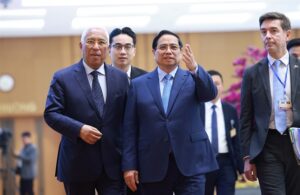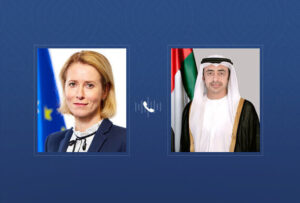EU hosts Southeast Asian leaders

Brussels, The Gulf Observer: European Union and southeast Asian countries commemorated 45 years of diplomatic ties Wednesday at a summit overshadowed by political distractions in Europe, ranging from the war in Ukraine to a bribery scandal.
EU leaders hosted counterparts from the Association of Southeast Asian Nations, or ASEAN, in a nod to Asia’s economic rise. But the meeting comes at a time of increasing difficulties in the 27-nation European bloc.
“We have to make sure that we have a strong position in our relationship with ASEAN,” Dutch Prime Minister Mark Rutte told reporters in Brussels. “We are talking about worldwide supply chains. We are talking about growth potential.”
The EU is looking for trade and investment possibilities across much of the world, especially in emerging economies, after its economy was battered by the COVID-19 pandemic before the war in Ukraine compounded the problems and put the bloc at risk of a recession.
Disrupted Russian energy supplies have affected financial markets and driven up inflation, driving up the consumer cost of everything from food to heating. Along with seeking out new sources abroad and at home, the EU is weighing devoting extra funds to help businesses in Europe cope with high energy prices and to counter an American subsidy spree.
But the bloc’s struggle to impose a price cap on Russian natural gas and a European Parliament corruption case have distracted attention away from Wednesday’s one-day EU-ÁSEAN summit.
French President Emmanuel Macron, who flew to Qatar to watch France’s semifinal match against Morocco in the World Cup on Wednesday evening, did not attend the event. On the side of the 10-nation ASEAN, Myanmar’s junta leader – Min Aung Hlaing – was absent because the EU refused to invite him.
The other ASEAN members are Brunei, Cambodia, Indonesia, Laos, Malaysia, the Philippines, Singapore, Thailand and Vietnam. The members, ,which together represent 660 million people, rank among the world’s top 10 economies.
High on the agenda was a push for deeper infrastructure ties between the EU and ASEAN, with Europe seeking projects under its “Global Gateway” program that is something of a European answer to China’s “Belt and Road Initiative.”
“In the global world that we are living in today, it is very important that we are connected to like-minded countries,” Estonian Prime Minister Kaja Kallas said.
Both sides also focused on creating more clean energy to fight climate change and on deepening economic relations through greater trade. An EU push more than a decade ago for a free-trade agreement with ASEAN as a whole gave way to targeted deals with individual members.
The EU has negotiated trade pacts with Singapore and Vietnam and is in talks with Indonesia on a similar accord. European free-trade negotiations with Thailand, Malaysia and the Philippines are on hold.


